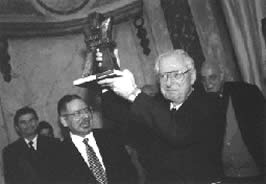
Polish Ambassador Eugeniusz Noworyta looks as if he has just won the World Cup (and indeed the Polish team has been performing impressively in World Cup qualifying play thus far) but he may have something far more valuable in his hands … recognition from The International Raoul Wallenberg Foundation for the work of Polish diplomat Jan Karski (1914-2000) in bringing world attention to the plight of Europen Jews during the Second World War.
Recollections of the Holocaust are relatively frequent and sometimes even fashionable events but the International Raoul Wallenberg Foundation‘s tribute to Polish diplomat and resistance hero Jan Karski at the Polish Embassy last week was a rare occasion when more anger seemed to be directed at Allied apathy than at Nazi atrocities.
Polish Ambassador Eugeniusz Noworyta began the ceremony by presenting Karski as strongly Catholic like so many Poles. Born in the textile city of Lodz in central Poland in 1914, his real name was Jan Kozielewski. Jesuit-educated, he graduated in Law from the University of Lwow and embarked upon a diplomatic career.
When war came in 1939, Poland could only offer courage, Noworyta said – a courage fully reflected by Karski on the Eastern front in 1939 and even more by his later work for the Polish underground resistance. A polyglot with a photographic memory, he was a natural choice as a Resistance courier.
In 1942 Karski ran the enormous risk of twice entering the Warsaw ghetto disguised as a Jew and also secretly penetrated Belzec death camp for an hour, becoming probably the first non-Jewish and hence entirely objective eyewitness of the Holocaust to tell the tale. As soon as his work took him to London, he recounted the Jewish tragedy to Foreign Secretary Anthony Eden, the leading Conservative Lord Cranborne and the Labour politicians Hugh Dalton and Arthur Greenwood.
But his graphic account of Holocaust atrocities fell on deaf ears. He was told that if the Germans were so foolish as to lose sight of military strategy with such ‘secondary’ objectives as the extermination of the Jews, the Allies had no intention of repeating the error.
‘If Hitler wants to waste his trains transporting Jews to concentration camps, let him!’ and ‘What do you expect us to do? Bomb the camps so that they die quicker?’ were among the responses he received. The writer H.G. Wells a lifelong socialist, told Karski: ‘You’ve got to look at the reasons why anti-Semitism has emerged in all the countries where Jews live.’
It was no better in the United States where President Franklin D. Roosevelt, New York Cardinal-Archbishop Francis Spellman and Supreme Court Justice Felix Frankfurter were among those whom Karski met in mid-1943. FDR pumped Karski for four hours for information on Europe behind the lines but showed zero interest in the plight of the Jews. Frankfurter, a Jew himself, simply refused to believe his story, as did other US Jewish leaders.
Karski’s 1944 book The Secret State places on record that Western leaders were well aware of the Nazi genocide for years before the end of the war.
After the war Karski was a professor of law philosophy and political science in the USA, often visiting his native Poland in the last 10 years of his life before his death last July. He was made an illustrious citizen of the State of Israel and also received the Order of the White Eagle, Poland’s highest decoration.
The occasion was also addresed by writer Marcos Aguinis, Father Horacio Moreno and Lodz Ghetto and Auschwitz survivor Jack Fuchs while the Foundation’s Executive Director Gustavo Jalife read out endorsements of the event from all over the world including United Nations Secretary General Kofi Annan, Czech President Vaclav Havel and New York Mayor Rudolph Giuliani. Aguinis, who together with Swedish Ambassador Peter Landelius presented the Polish Embassy with a sculpture honoring Karski, underlined world responsibility for the Holocaust, pointing out the failure of a 1938 internatinal conference on the Jewish refugee question to offer any alternative to the ‘final solution.’
